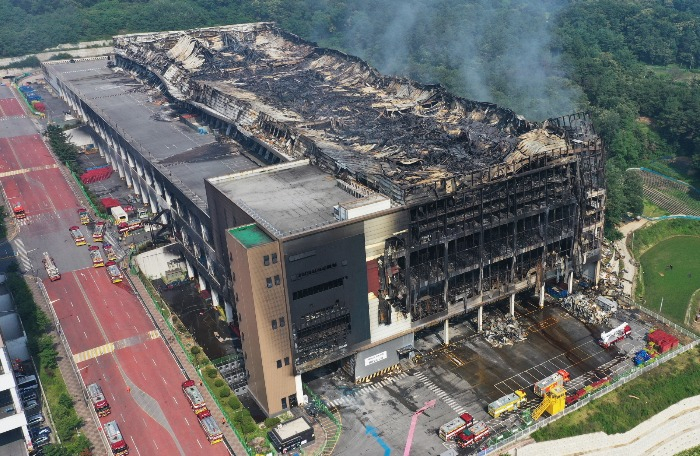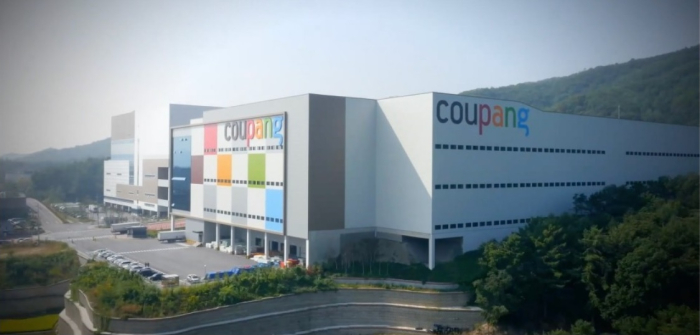Warehouse investments in Korea on hold after Coupang fire
Municipal governments shelve warehouse building permits ahead of tightened relevant laws
By Aug 30, 2021 (Gmt+09:00)
LG Chem to sell water filter business to Glenwood PE for $692 million


Kyobo Life poised to buy Japan’s SBI Group-owned savings bank


KT&G eyes overseas M&A after rejecting activist fund's offer


StockX in merger talks with Naver’s online reseller Kream


Mirae Asset to be named Korea Post’s core real estate fund operator



South Korean landowners, in particular in the Seoul Metropolitan Area, were recently forced to stop negotiations with the would-be buyers of their land-to-be distribution centers as local governments have been sitting on applications for new warehouse construction for about a month.
The municipal governments have shelved new construction permits on warehouses after lawmakers proposed a series of bills aimed at tightening safety standards on new construction following the devastating fire at Coupang Corp.'s distribution center in June.
A number of the landowners have canceled their plans to sell the land where new distribution centers are expected to be built since the start of this month, taking back the information memorandum they sent to potential buyers on the land, according to investment banking sources on Aug. 30.
"The land, which we had no doubt will receive construction approval, has not obtained the permit for a month. Accordingly, we stopped reviewing warehouse investments in the stage of applying for construction permits," an asset management source told Market Insight, the capital news outlet of The Korea Economic Daily.
"If parliament changes the standard for measuring the floor area, we will need to review all our distribution center investments again from the scratch."
He referred to the proposed revision to the construction laws. A ruling party member Baek Hye-ryun has put forward a motion to strengthen fire safety regulations, under which the underground floors should be included to measure the total floor area of warehouses and other buildings.
Currently, the basement area is excluded from the calculation of the building's total floor area against the size of its land. If the new bill is voted into law, the land suitable for a five-story warehouse with two underground floors will be now developed into a three-story facility with two underground floors.
"Until now, the underground area has remained a regulatory blind spot that avoids safety regulations," Baek said. "We need to strengthen the safety regulations of large distribution centers."
Further, a member of the main opposition People's Power Party suggested a set of new firefighting laws which would toughen the process for construction authorization and tighten the relevant corporate regulations.
Given the high likelihood that the bills pending in parliament will be passed, the municipal governments are expected to revisit the applications for new distribution center construction after the new bills set in, the industry observers said.

From an investor's perspective, the toughened regulations could cut the attractiveness of warehouses as their preferred alternative investment. Their expected returns will likely decline further from the current level between 4.5% and 5.5%, which has been already lowered due to a series of large-scale of fires destroying Korea’s major warehouses over the past few years.
The six-day fire at Deokpyeong distribution center of Coupang, South Korea's No. 2 e-commerce platform, is estimated to have incurred several hundreds of million dollars in damage. The four-story facility was built on land measuring 63,241 square meters in Icheon, Gyeonggi Province, southeast of Seoul.
The fire also was speculated to result in a drastic increase in premium for fire and property damage insurance in the warehouse segment.
Other asset managers and brokerage companies, which have already invested in the land to be developed into distribution centers or lent loans to the projects, are keeping a close eye on the upcoming regulatory changes as well.
"Now that the land development for warehouses hits a snag, those who have made the early-stage investment in the land will suffer from the decline in their land values," said an investment banking source.
On the flip side, the tightened regulations mean a higher entry barrier to the warehouse sector and will likely boost demand for the existing distribution centers, including old ones, due to a lack of new supply, the sources added.
Write to A-young Yoon at youngmoney@hankyung.com
Yeonhee Kime edited this article.
-
 Artificial intelligenceGoldman mulls redemption option for Coupang loan, but still undecided
Artificial intelligenceGoldman mulls redemption option for Coupang loan, but still undecidedJun 29, 2021 (Gmt+09:00)
3 Min read -
 Artificial intelligenceCoupang fire may cut ROI of warehouse assets
Artificial intelligenceCoupang fire may cut ROI of warehouse assetsJun 22, 2021 (Gmt+09:00)
2 Min read


